If you want to grow your own bean sprouts, ready to eat and enjoy in fresh salads, you’ll need a good sprouting jar set up to do it well. While they are not essential for the job, they make managing moisture levels and humidity simple, and help to prevent stagnation, which often occurs even in commercial settings.
Recent information about the prevalence of salmonella in mass-produced bean sprouts has got many kitchen gardeners thinking about how to produce their own food. If you’re trying to grow safer, cleaner, and more sustainable crops for your own kitchen, follow this guide for how to use and maintain sprouting jars.
More...
Sprouting Jars Australian Guide
What are Sprouting Jars?
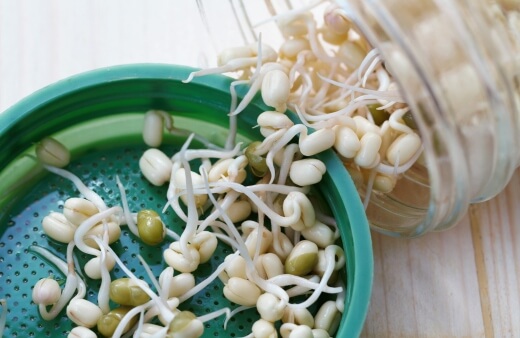
Sprouting jars are, in essence, just jars that can breathe. You can make your own by cutting around the lid of an old glass jar, and placing a circle of gauze on the inside, but the seals provided with custom-made sprouting jars, and the stands they sit on make them more efficient than DIY sprouting jars.
How to Use Sprouting Jars
Growing sprouts in a jar is incredibly simple and takes less than a week to produce fresh, crisp, flavour-packed sprouts. Brassicas, like broccoli and spring greens, make incredible salad sprouts, as they have the sweeter notes of brassica flavour, without the earthy finish of mature greens.
Whatever you choose to grow though, it’s worth making sure you’ve got the right kit:
You’ll need sprouting jars (any glass jar will do, but we’ve reviewed a few of the best down below), sprouting lids (they come with your sprouting kits, or you can make your own), and a stand to hold them on an angle, with the sprouting jar lid facing the ground.
For a more engaged setup, look for microgreens kits that allow you to grow multiple salad sprouts alongside each other, without getting them mixed up.
What to Grow in Sprouting Jars
You can grow everything from coriander to broccoli in sprouting jar kits, but it’s important to remember that the aim isn’t fully mature plants at the end of it.
Most vegetables or herbs don’t like being planted out or handled as seedlings, so growing them without soil means you’ll get very few roots, and a short, stubby stem (the sprout) with the seed still attached.
You can eat the whole thing, seed and all, and your sprouts will have a similar, but lighter flavour than the mature herbs and veggies you’re used to.
We’ve listed some of our favourite plants for salad sprouts below.
What herbs can be grown in microgreen kits?
Any soft herb can be grown for salad sprouts. Woody herbs like lavender, rosemary, thyme, and oregano don’t work well as sprouts – partly because they are harder to germinate, but mostly because they develop more slowly and without the soft but crisp texture.
Stick to soft herbs like:
- Basil
- Coriander
- Parsley
- Chives
- Dill
- Tarragon
- Marjoram
- Chervil
- Chamomile
All of those herbs work wonderfully well, both for their ease and speed of sprouting, but also for flavour. Chamomile sprouts are incredibly delicious, but they have a really strong, peppery flavour, while chives, tarragon, and dill have a nearly identical flavour to their mature counterparts.


Get Your Free Guide:
Master Growing Australian Natives eBook
A Must Have Complete Guide for Every Australian Garden
Get Your Free Guide:
Master Growing Australian Natives eBook
A Must Have Complete Guide for Every Australian Garden
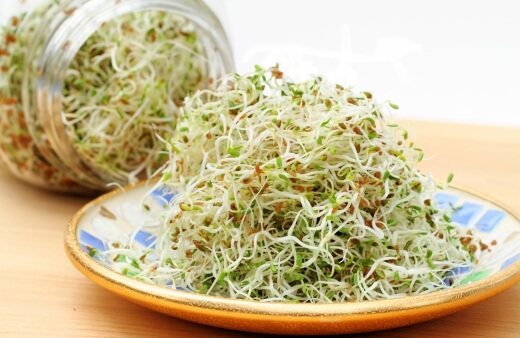
What vegetables can be grown in sprouting jars?
There are SO many vegetables that can be grown for salad sprouts in sprouting jars, and with fast results, it’s worth trying a few less-likely choices too.
One of the most common pieces of advice online is to steer clear of root veg, but if you get the sprouts right, they are packed with a rich flavour that you can’t get from anything else.
Root veggies that work in sprouting jars:
- Beetroot
- Carrots
- Celeriac
Beans and grains that work in sprouting jars:
- Broad beans
- French beans
- Peas
- Lentils
- Chickpeas
- Millet
- Sweetcorn (all corn)
- Buckwheat
Brassicas that work in sprouting jars
- Broccoli
- Kale
- Spring greens
- Chard
- Cabbage (any type)
- Cauliflower
- Mustard
- Rocket
Other edible plants that work in sprouting jars:
- Alfalfa
- Chia
- Clover
- Flax
- Leeks
- Sesame Seeds
- Sunflower seeds
For me, brassicas are the best choice, but playing with root veg sprouts is always fun, and adds a delicate sweetness to any salad. If you’re growing with a sprouting jar to add more variety to your diet though, try chia sprouts or alfalfa sprouts for roughage and a more wholesome flavour.
How Long to Grow Sprouts in a Jar
Sprouting jars work quickly, but that means you need to stay on top of them. It’s not the sort of crop you can leave for a few weeks before harvest, so getting the window right is important.
With some plants, you can get big enough sprouts to eat within 2-3 days, with others, it can take up to a week, and it will all depend on the time of year, light levels, and temperature too – particularly with spring-sowing veggies, which won’t germinate without at least 8 hours of daylight
How long until the first harvest with sprouting jars?
Start small and simple using fast-germinating seeds like rocket or mustard, wet them, and make sure there is enough humidity in the jar and sprouting lid to support their initial growth. After about 3 days, you’ll have salad sprouts ready for harvest.
How long will each seed kit last in a sprouting jar?
Move your jar around gently every day once you’ve harvested your first sprouts, and continue to harvest for up to a week. After that, the sprouts will weaken without soil or fertiliser, and need re-sowing.
Best Sprouting Jars for 2025
1. Snader Complete Sprouting Jar Kit
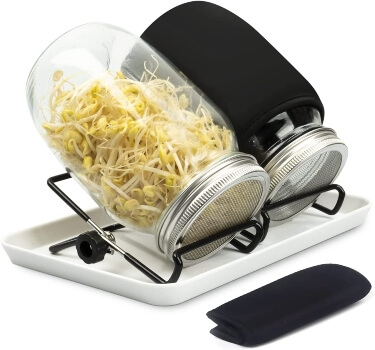
Snader’s sprouting jars are cleverly paired, with a support frame included in the sprouting jar kit.
The jars are clear, for speedy germination of seeds that require light to develop, but they are sold with a pair of jar-sleeves, to block light for crisper, and faster germination of sprouts like peas and broccoli.
Many sprouting jars are sold with static frames too, but this kit has a lovely hinged base that allows jars to be turned to drain excess moisture or grow them in humid but fully-drained environments.
2. STWIE Sprouting Seeds Jar Kit
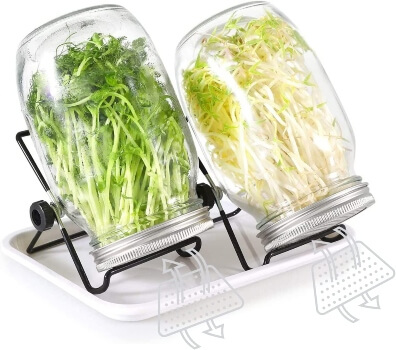
STWIE are a basic Amazon store, but their sprouting kit actually solves a lot of basic problems. The sprouting kit frame, and drainage board are ideally fitted to the jars provided, but what sets them out is that this is a pair of bases, not one double base.
When space is a challenge, and your windowsills are already packed with houseplants and seedlings, having the option to separate your kit into different areas makes a big difference.
3. Country Trading Co. Sprouting Lids Kit
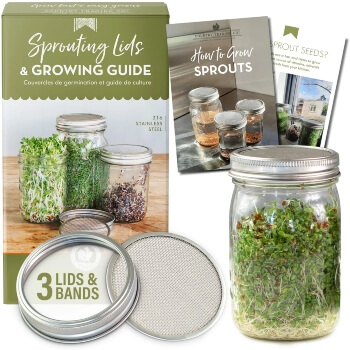
Country Trading Co.’s simple sprouting kit includes perfectly fitted lids, one large jar, and two smaller jars, making it ideal for a wider range of sprouts. The simplicity of the jars is what makes them brilliant, and their breathable, but warm growing space makes sprouting fast and efficient.
It doesn’t have the option, or kit, for flipping our sprouting jars, so they are limited in that respect, but they are well made, and beautifully packaged, especially if you’re buying them as a gift.
4. Sprouted Broccoli Sprouting Jar Kit
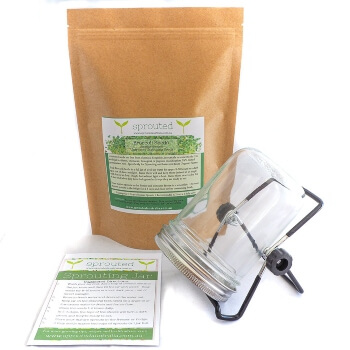
Sprouted is a dedicated Australian brand for seed sprouting, and provides a range of kits, including seeds to get you started. This kit is sold with broccoli seeds, two neat jars, with tightly fitted sprouting lids and a rocking base.
If you prefer to get everything all in one go, and like knowing you’re supporting a decent Australian business, Sprouted is a great place to shop.
5. Sydney Sprouts Twice the fun kit
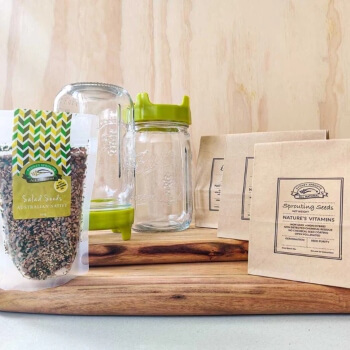
Sydney Sprouts, another Australian specialist, sells my favourite sprouting jars. They’re not cheap, but they have bespoke plastic lids that are easy to clean and won’t rust over time.
This sprouting kit comes with seed mixes for beautifully varied salads and stir fries, and the jars are big enough to grow substantial crops like bean sprouts, which need a little bit more room.
They don’t come with a stand, because they don’t need it, thanks to their cleverly designed lids which act as a stand in themselves!
6. Nourishme Masontops Complete Sprouting Kit
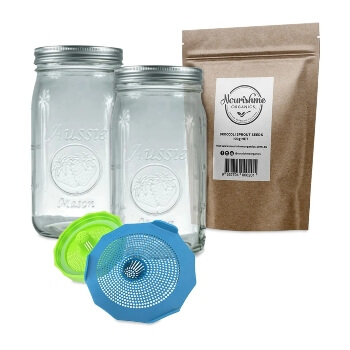
Nourishme Organics provide clever, multipurpose sprouting jars, which can be used as jars over winter for preserving other crops, as well as sprouting jars through summer.
Their plastic lids provide good aeration when used upside down, and are super easy to clean and maintain. Provided with broccoli seeds, ready to grow from day one, these neat, spacious sprouting jars are an ideal gift for anyone who loves a kitchen gadget.
7. Urban Plant Growers Speedy Sprouters
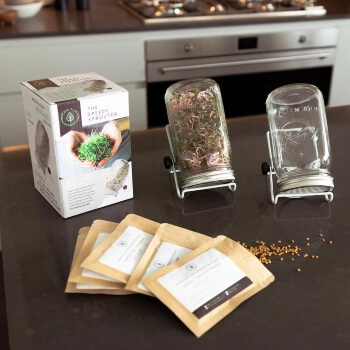
Speedy Sprouters from Urban Plant Growers are just part of their huge range of home-growing kits, and they’re definitely one of their best. The simple lids are well-fitted and secure, with a simple stand.
Unfortunately, they don’t come with a draining tray, but for a great price, it is worth trying this sprouting jar kit out. You can choose a single jar, or two if you want to grow sprouts on rotation, and there’s an option to add some beautiful seeds to the mix too, so your kit comes ready to use.
Sprouting Jars Frequently Asked Questions
What size jars are best for sprouting?
Beans and peas need a larger jar for sprouting, simply because their seeds are larger, and the sprouts are thicker. For smaller seeds, any sized jar with a proper sprouting jar lid will work perfectly.
What are the healthiest sprouts to grow in a jar?
Broccoli, clover, any wheat crop, or alfalfa are definitely up there with the healthiest sprouts as they are packed with nutrients even at their seedling stage. Bean sprouts make great additions to salads and stir fries too, with a delicate flavour overridden by a high water content that makes them sturdy and crisp.
Do sprouts in a jar need sunlight?
Sprouting jars don’t need sunlight to germinate, and many crops will germinate perfectly well (even faster) in the dark. However, most seeds for sprouting jars are triggered into germination by a combination of light, heat, and moisture, so for faster results, place your sprouting jar somewhere warm and bright, but away from direct sunlight.
Is growing sprouts in a jar safe?
Growing your own sprouts at home is much safer than buying them from a supermarket. Supermarket bean sprouts or alfalfa sprouts are often grown on water recycled from hydroponics, sometimes with natural fertilising methods including living fish that oxygenate, move, and fertilise the water, which means safety screening is difficult.
For more reviews on gardening and planting tools, check out our list below:
Wrapping Up Our Guide to Sprouting Jars
For fresh, home-grown salads, any sprouts are worth trying. They add a depth of flavour and texture that you simply won’t get from leafy salads, and they’re quick to produce too. If you’ve got a dinner party coming up this weekend, you can order a sprouting kit on Monday and have fresh salad shoots to serve up by Saturday.
If you’re not sure if sprouting kits are an investment for you, try making a simple DIY sprouting jar at home to test out the flavours you like, and then invest in one of the best sprouting jar kits from our list above to scale up the operation.
Published on April 1, 2023 by Gary Clarke
Last Updated on December 27, 2025




